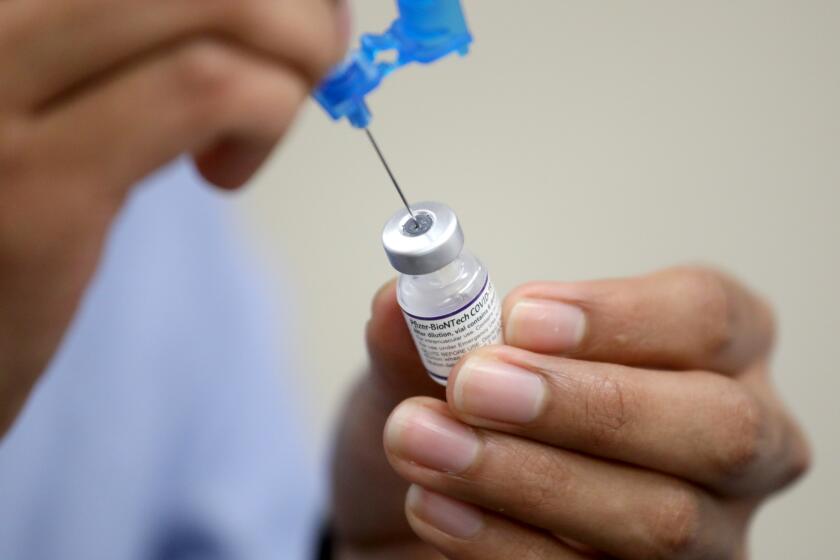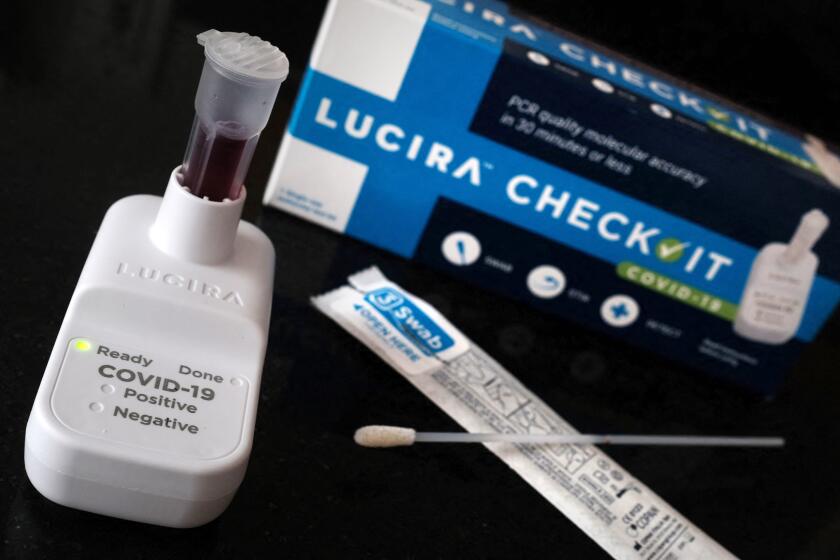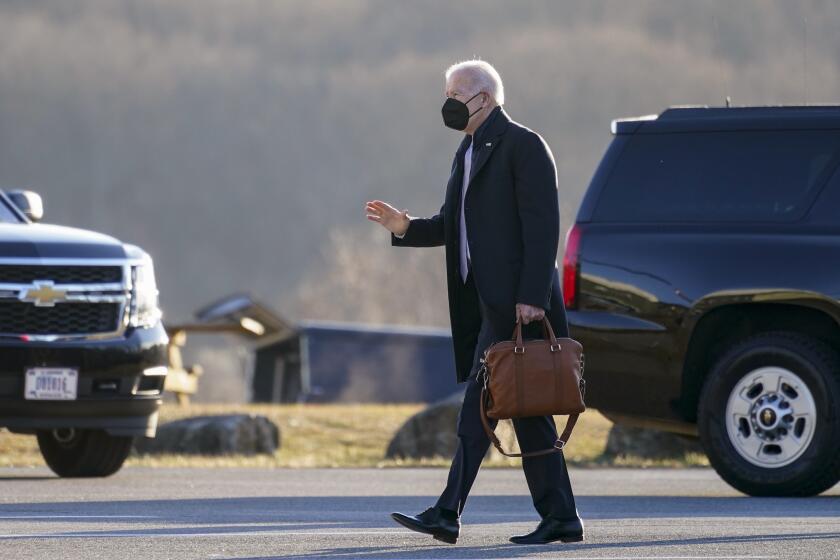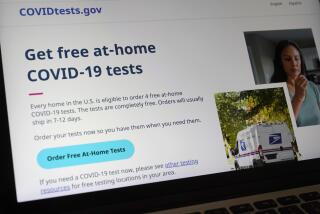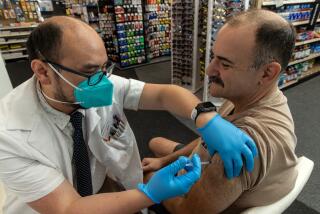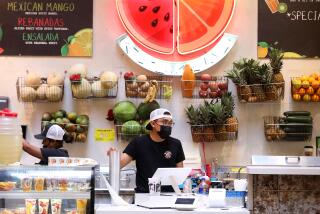Demand for rapid at-home COVID-19 tests is so high, pharmacies are rationing
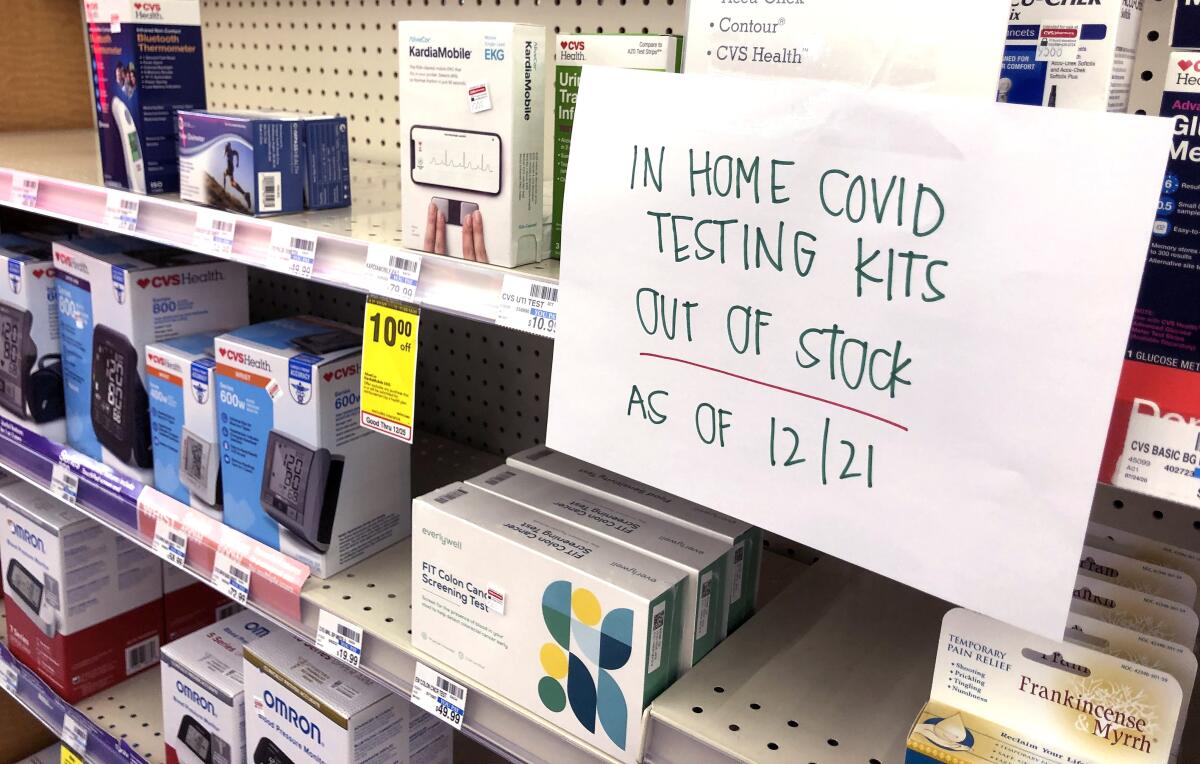
- Share via
One highly sought-after item to prepare for safer holiday gatherings is frustratingly hard to find — at-home rapid COVID-19 tests.
A surge of coronavirus cases tied to the Omicron variant ahead of Christmas weekend has prompted a crush of demand for the over-the-counter antigen tests that can be conveniently taken at home.
“Unprecedented demand” is how a representative for BinaxNow — a popular rapid antigen self-test that offers results in 15 minutes — described the rush on their test.
“We’re sending them out as fast as we can make them,” said John Koval, director of public affairs for Abbot’s Rapid Diagnostics team, which oversees BiNax. “Today, we’re back up to making well over 50 million BinaxNOW tests per month, and we’re heading to 70 million a month in January.”
Calls on Monday to a dozen pharmacies in Los Angeles County came up empty-handed for the rapid tests. One store was sold out and suggested another nearby. That store was also sold out but expected a shipment the morning of Dec. 24. Other stores had been wiped out of all tests for days and could only offer to searchers hope that more would arrive this week in time for festivities.
Walgreens said higher than ever demand across the country began after Thanksgiving and has only grown since. The company has imposed a four-item limit in stores and online for the purchase of at-home COVID-19 testing products. CVS, which has imposed a six-item limit on COVID-19 at-home testing products, said it, too, has been working with providers to restock its over-the-counter inventory, which includes the Abbott BinaxNOW, Acon FlowFlex, Quidel Quickvue, Ellume and Pixel by LabCorp tests, amid a spike in demand.
Omicron surge could hit some parts of California much harder than others, with the Bay Area poised to weather the impact the best and the Central Valley the worst.
“In the event a local store experiences a temporary shortage, our teams have a process in place to rapidly replenish supply,” said Monica Prinzing, CVS spokesperson.
“Due to a recent increase in demand related to a surge of increasing COVID-19 cases, and to retain community-based access to tests in our stores, there may be temporary out-of-stocks for these products online at CVS.com.”
Health experts have continued to encourage residents to get vaccinated and boosted. Ahead of the holidays, they’ve also encouraged more widespread testing, especially for individuals who have come into contact with someone who tested positive for the coronavirus, have shown symptoms, before and after travel, when gathering with people from other parts of the country, and after spending time in crowded indoor spaces.
Rapid tests are highly recommended just before entering a holiday party — including among vaccinated people, who are at risk of breakthrough infections from the Omicron variant. Because the rapid test’s results come in 15 minutes, the tests can be far more useful than a PCR test when trying to determine if you’re currently contagious. With a PCR test, nose or saliva swabs are collected and sent to a lab for analysis, with results coming back a day or two later.
The delay in return results mean the reading is old, and could potentially provide outdated information about whether a person is actually contagious.
“If you’re going to be indoors, you all should be testing before you show up at that gathering,” Los Angeles County Public Health Director Barbara Ferrer previously said.
Dr. Paul Sax, an infectious-disease expert at Harvard Medical School, said at a recent UC San Francisco forum that when he visits his elderly parents, he takes a rapid test right before he sees them. He said it’s important that people take the test as close as possible to the actual visit.
Sax said he wouldn’t visit his parents if he had any signs of a respiratory illness, such as a scratchy throat, even if the rapid test results showed a negative result.
Some experts think it would help to make some adjustments, but many health experts are also emphasizing the importance of seeing family and friends.
“People should not use rapid tests, when they have a respiratory tract infection, as a way of reassuring themselves falsely that they may not have COVID,” Sax said.
A negative rapid test result for a symptomatic person doesn’t rule out a COVID-19 infection, Sax said. “I would not go visit grandma with a respiratory tract infection in the COVID-19 era, period,” Sax said
If a rapid test turns up positive, “you must consider yourself infected and isolate immediately,” said Dr. Dawn Terashita, associate director of L.A. County’s acute communicable disease control program, at a recent town hall.
Those who test positive must stay home for at least 10 days since symptoms first started, or, if there are no symptoms, then at least 10 days after the test was taken.
Rapid tests may result in a small number of people getting a negative test result when they’re actually positive, Terashita said. “If there’s concern about the possibility of a false negative test, the test can be repeated 24 hours later,” she said.
People who are symptomatic and get a negative rapid coronavirus test result “should retest and get a [PCR] test to confirm that you do not have COVID,” Terashita said.
PCR tests are often used to confirm the results of a rapid test, and are less likely to result in inaccurate results, Terashita said. Still, like any test, PCR tests can produce a very small number of false positive or false negative tests.
Omicron — now the dominant coronavirus strain in the U.S., accounting for 73% of new infections last week — is expected to cause more breakthrough infections among vaccinated people — underscoring the importance of testing to control spread of the coronavirus.
There are hundreds of testing sites across Southern California, and rapid test kits can be bought at pharmacies or ordered online.
Early indicators have suggested that although the Omicron variant is highly transmissible, it may be less severe than the Delta variant. But even if that turns out to be true, its ultra-contagious nature could still lead to overwhelmed hospitals if far more people become infected.
For those who have had a known COVID-19 exposure, UC San Francisco epidemiologist and infectious-disease expert Dr. George Rutherford suggests laying low until a test can be performed. For those who wanted to get tested before gathering with family but find themselves out of luck and time, the risk assessment is personal.
“If you’re boosted, I’d be less concerned. If you’re unvaccinated or not fully vaccinated or even un-boosted, I’d be a little more concerned. If you’re unvaccinated, I’d say forget it — the risk is way too high,” Rutherford said.
President Biden’s promise to end the pandemic is being tested by the Omicron variant, which is spreading rapidly through the country.
So, what should a person do if an at-home test can’t be found right away? Restocks and online orders are a possibility. Or, if there’s time to wait a day or two for a result, PCR tests are available through county testing sites and medical providers.
L.A. County’s Department of Health Services said there are hundreds of COVID-19 testing partners in the county, some of which offer rapid tests and same-day results. In a press briefing Tuesday, Health Services Director Dr. Christina Ghaly said 60% of the county’s testing capacity is currently going unused.
“We have ramped up and down, throughout this pandemic, the availability of community testing based on demand and are able to ramp it back up as needed in the future,” she said.
Earlier this month, President Biden announced that insurance companies will be required to reimburse people for the purchase of at-home tests and that 50 million tests will be distributed to community health centers and rural clinics. According to a senior Biden administration official, the federal government plans to acquire 500 million at-home tests that can be purchased through a website. But the system isn’t expected to be running until January.
On Tuesday, Biden defended his record on testing and said his administration has pushed for further production. But he said no one anticipated how rapidly Omicron would spread.
“All of a sudden, it was like everybody rushed to the counter. It was a big, big rush.”
Ferrer said last week that the department planned to ramp up its rapid test partnerships with community sites.
“We plan on starting a distribution in partnership with the state of these over-the-counter rapid test kits through our food pantries, our community organizations, and our social service agencies so that those with limited economic resources will also have access to over-the-counter rapid test kits before the winter holiday.”
Times staff writers Chris Megerian and Luke Money contributed to this report.
More to Read
Sign up for Essential California
The most important California stories and recommendations in your inbox every morning.
You may occasionally receive promotional content from the Los Angeles Times.


